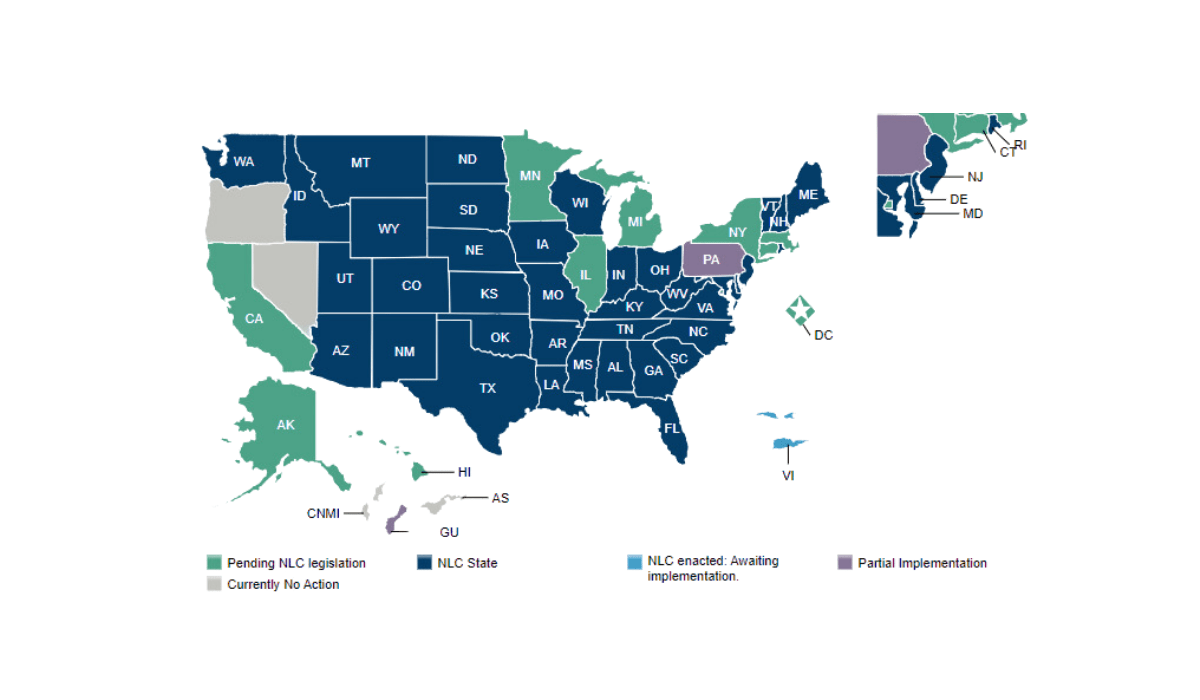Whether you’re starting your first travel nurse contract or seeking a new destination for your dream job, understanding how your license translates from state to state is crucial. We’re dedicated to equipping you with all the necessary resources and information to facilitate your journey into your next job opportunity. Here’s your comprehensive guide to navigating the licensing and credentialing requirements for travel nurses.
Travel Nurse Certifications and Licenses
As a registered nurse practicing in any state in the United States, you must be licensed. However, as a travel nurse, certain license requirements can impact where you go. The NLC enables an RN or LPN with a primary state residence in an NLC state to hold one multistate license valid for practice in all NLC states. Be open with your recruiter about your personal and professional goals right from the start to kick the process off smoothly. Plus, our travel nurses enjoy a faster, hassle-free experience!
The first step when deciding what state to take your next assignment in is to apply for any separate license you may need. Knowing if you do or not starts with checking the Nurse Licensure Compact (NLC), an agreement that allows Registered Nurses to practice legally in other states that also participate. You can use this tool to learn more about where your license is transferrable in the Nurse Licensure Guidance Tool.

Key considerations include:
- Research: Begin by researching licensing requirements for your desired states using resources like the National Council of State Boards of Nursing (NCSBN) or the Federation of State Medical Boards (FSMB).
- Application Process: Understand the application process for each state, including any additional documentation or exams required.
- Timelines: Keep track of application timelines for each state to avoid delays in starting assignments.
- Temporary Licenses: Explore eligibility for temporary or expedited licenses, particularly if you hold a license in a compact state, allowing practice while awaiting permanent licensure.
Credentialing Essentials:
In addition to state licensing, travel healthcare professionals undergo credentialing to meet healthcare facility standards. Credentialing verifies education, training, and professional experience to ensure qualification to provide care. Streamline the process with these steps:
- Gather Documentation: Collect necessary documents such as diplomas, certifications, licenses, and work history to expedite credentialing.
- Complete Applications: Accurately fill out credentialing applications, checking for discrepancies or missing information before submission.
- References: Provide references from colleagues, supervisors, or professors, informing them in advance to ensure prompt responses.
- Background Checks: Be prepared for standard background checks, including criminal background checks and drug screenings, to ensure patient safety.
Resources and Travel Tips from Recruiters:
- Make a Travel Destination List: Prepare a list of desired locations to assist your recruiter in planning.
- Research Your License: Determine the states where your license is valid or how to obtain one swiftly.
- Start Applying Early: Obtain licenses ahead of schedule while on assignment to simplify future job applications.
- Update Your Travel List: Remain flexible and open to new destinations for diverse adventures.
- Join Professional Associations: Joining associations like the American Nurses Association (ANA) or the American Medical Association (AMA) provides travel healthcare professionals access to resources, support, and networking opportunities.
Keeping Your Nursing Documents Updated:
Maintaining updated nursing documents is crucial. Here’s how:
- Personal Identification: Although having a Valid ID is required, ensure you always have another source of identification in case of an emergency.
- Medical Records: When preparing to submit to jobs, having documents prepared with copies of your medical records is helpful. Using a transcript of your patient portal is an easy way to provide the necessary documents while applying.
- Nursing Credentials: Have a copy of your degree, state license information, and any credentials you have for easy access.
- Digital Files: put any necessary documents away in a safe folder that is easily accessible while on the go. Whether you’re using a USB or Google Files, having your paperwork up for grabs at any moment is essential.
How CrossMed Helps You 👇
At the end of the day, it can be a daunting task navigating all the details of getting your licenses. CrossMed’s Compliance and Credentialling team is here to serve you and make the process as easy as possible! We will walk you through the necessary steps to get you to the destination of your dreams!
Let’s Start Traveling!
A career as a travel healthcare professional is full of new challenges and adventures. However, navigating the complexities of state licensing and credentialing can be overwhelming. By understanding the requirements, staying organized, and utilizing available resources, you can streamline the process and focus on what you do best – providing exceptional care to patients across the country.
Remember, flexibility and patience are key when navigating the credentialing process as a travel healthcare professional. With thorough research, careful planning, and the right support, you’ll be well-prepared to embark on your next adventure in healthcare. Are you interested in traveling to a new destination? Contact a recruiter today to learn more!

